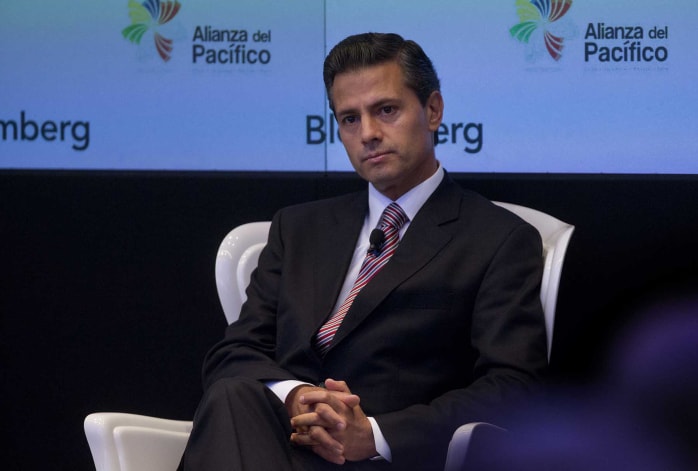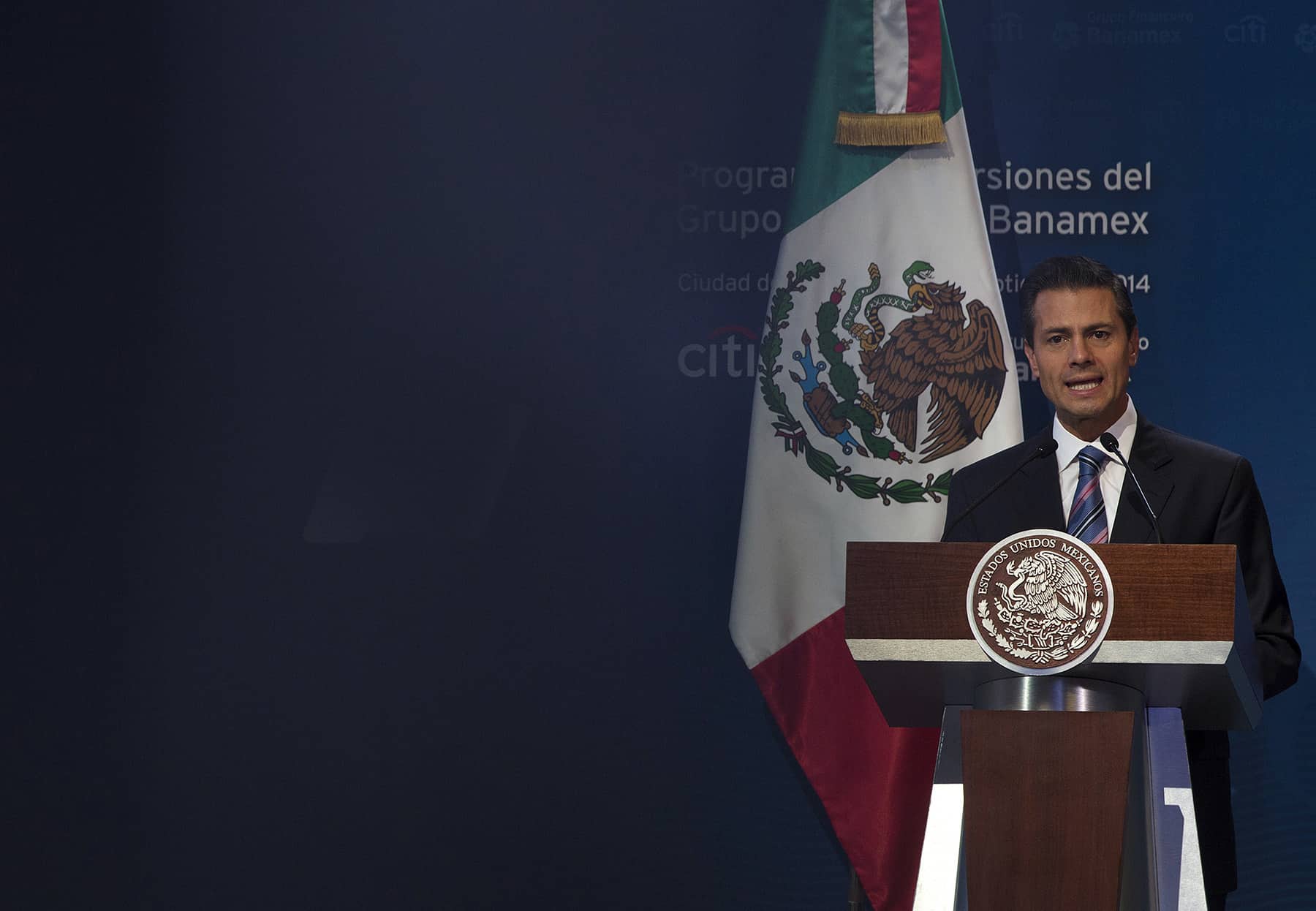NEW YORK — A hero in the financial world for the reforms he has enacted to open up Mexico’s economy, President Enrique Peña Nieto took time out from his appearances at the United Nations and the Economic Club of New York this past week to talk about the U.S. border, crime and security, and how, in almost two years in office, he has sought to change his country. Excerpts follow:
WP: You just passed a lot of significant reforms that most of your predecessors dreamed about but no one imagined would be enacted. How did you persuade your opposition to join you?
EPN: It was in the interest of all political parties to make the changes that would allow us to break the gridlock we’ve had for so many years. We had to change. All the reforms were envisioned when I was running for office — in the areas of energy, education and telecommunications. Then, during the long transition period after my election, we decided to reach agreements with the representatives of different political forces. So the day after I was sworn in, we signed the “Pacto por Mexico,” in which we defined the goals to be reached and the deadlines for the reforms.
Why would they suddenly agree that energy reform and others should be carried out when they had never agreed before?
The reforms we achieved did not enjoy the support of everybody, but they did receive the support of the majority needed to pass them. The pact defined topics and specific subject matter to take action on. The first reform that we managed to pass was the education reform. This was a reform that was passed on a consensus basis. We began with the reforms that had the most support.
But there was resistance to the education reform, wasn’t there?
Yes, there was. And we still have it from certain sectors of the teachers union.
Didn’t you put the head of the largest teachers union in jail?
That is not related. The process of the reform started way before the leader of the teachers union was put in jail.
You had bureaucrats examine teachers and evaluate them based on merit. Is that correct?
That is correct. Education reform has as its main purpose to make sure that the education delivered is of quality. For that to happen, we had to professionalize teachers. The teachers are going to be examined periodically to make sure that they have all the skills needed to teach students. Of course, we have run into resistance from certain groups of teachers. But most have welcomed the reform. This first reform was passed specifically because it had the largest endorsement. It was passed unanimously. The three main political forces in the country endorsed the education reform as well as other reforms that came after it.
One of the main goals of the reforms is to broaden the rights of Mexicans. We needed a standard criminal code, the same rule of law all over the country. Instead of having different laws in every state, there will be the same law all over the country — at the federal and the local level — for any criminal procedure. Also, we have created an attorney general’s office that is autonomous and independent.
What else?
From 2018 on, any government after an election can decide to build coalitions with other parties. That may be common in parliamentary systems but not in presidential ones. We are creating incentives to create majorities to make future reforms possible with the support of a majority.
So the main reforms are education, energy, telecommunications . . .
I’m coming to that. The other important political reform is the creation of a transparency system, which is also independent. It means there is a system that obligates the three levels of government — state, city and federal — to be transparent.
The third goal is to enhance economic growth, which has been the main challenge we have had in the last three decades. . . . Our average growth in the past three years has been 2.6 percent, which is positive but not enough.

Haven’t you done things that will benefit Mexico in the long term, but Mexicans are frustrated with the lack of short-term results?
Yes. We have been explaining the reforms, and I am sure that some of them will have results in the very short term. Then you have the labor reform, which is already implemented and which will introduce flexibility into the labor market. It will allow new means to hire young people, women and others.
Can you fire people?
A: No. But you can hire them for a period of training and not necessarily [keep them on] if you are not satisfied with their performance. These new ways of hiring people open up the labor market. It incentivizes people being hired.
Can you describe your efforts at tax reform?
There has been a tax reform, and you know, tax reforms are not popular at all. But the aim is to have a more simplified tax code, to increase tax collections on those who have higher incomes and thus to strengthen the finances of the state. We want to be less dependent on oil-related income. Last year, we had a budget that allowed us to make larger investments in infrastructure, education, health, science and technology. It is foreseen that the increase in tax collections up to 2018 will represent 2.5 percent of our GDP.
The difficulty before you now is implementing the reforms you have enacted and creating independent regulatory agencies.
That is the difficulty with any reform. I would say the financial reform was made to give more credit to people and create more competition in the financial system. We have solid financial institutions, but they lent very little. So with the financial reform, we wanted to push them to lend more and to encourage the development bank to create instruments for lending mainly for micro and medium-sized companies.
You tackled some of Mexico’s oligarchs with the telecommunications reform.
The telecommunications reform opened that sector to more competition. It is against having monopolies. You have two television networks now, and two more will be launched next year.
That meant going up against some powerful people.
Every time you go for more competition, some people don’t like it, but that’s the way it is. We believe it is better for the people.
Some say your main achievement is energy reform.
Energy reform is maybe the most important because it has totally changed the way we have been exploring our natural resources, mainly the hydrocarbons. Under the reform, the state keeps possession of the hydrocarbons.
Pemex [Mexico’s state-owned oil company] keeps the hydrocarbons?
Pemex becomes a productive company of the state, but it will have competition and can make associations with the private sector. Now private investment is allowed to be made for exploration and exportation of our hydrocarbons. That is a big change. . . . We will have a regulatory commission to control the state market and buy energy at a more competitive price. The aim is to get more production and get the price of energy down.
What are you going to do about the immigration problem — about children crossing Mexico from Central America alone, hoping to reach the United States?
We have agreed with countries in Central America — El Salvador and Guatemala and Honduras, where most kids come from — to establish better border controls. Nevertheless, we have people who go through those controls and go to the northern border. We will give the best help to the children who are unaccompanied. We have created — since this phenomenon started — a system to give them medical services and shelter, and we have personnel to take them back to their countries of origin.
But they were hanging on top of trains, attempting to cross Mexico.
We have stopped that. In the last few weeks, we established controls in order to not to have people going onto the trains.
Is there any truth to the allegations [by Texas Gov. Rick Perry and others] that Islamic State fighters are crossing into the United States through Mexico?
There is no evidence that terrorists use Mexico to cross into the United States. There have been comments to that regard, but not one of those statements has contained hard evidence. We exchange information with the U.S. It is unacceptable to say that the Mexican territory is being used as a platform by terrorists to enter into the U.S. There is not the minimum proof or evidence pointing to that fact.
You captured drug kingpin Chapo Guzmán. How do you feel about the current security situation in Mexico? What is your strategy?
Security is a priority of my administration. . . . Now, we have better coordination with local governments — instead of competing against each other, the federal and local governments are working in tandem to fight crime. The results are quite encouraging. If you compare the figures of 2012 to those of 2014, the number of murders has dropped 29 percent. Other crimes have dropped as well, for example kidnappings. Most of the crimes that are committed — murder, extortion and kidnapping — have been because the criminal groups have been fragmented, because the cartel leaders were either apprehended, prosecuted or killed. At the beginning [of my term], we had 122 targets we identified as leaders of criminal organizations; 84 have been detained. This is quite encouraging, but there is a lot to do still.
What will you concentrate on in the next three to six months?
We have a lot of things to do, but I would point to two main goals. First, to reach the realization of the ambitious infrastructure projects we have planned. We are building the first high-speed train — it will be the first in the Americas. It will go from Mexico [City] to Querétaro [130 miles away]. [We are also building] some massive transportation systems like subways in the great metropolitan areas. In Guadalajara, we are building a suburban railroad. We have a project to double the capacity of our ports from the 280 million tons today to 500 million tons at the end of my administration. . . . We have announced a new airport in Mexico City. We have announced it, and we have the land. In the next four years, we hope to start construction of the airport that will create many jobs and manage up to 120 million passengers [per year].
So right now?
I intend to put the reforms into action — to have them implemented.
But the Pacto por Mexico is over, right?
Yes, it’s finito. We have an election next year. But [in the past 18 months] we have managed to pass the most transformational reforms that Mexico has had, and that’s thanks to the Pacto por Mexico.
© 2014, The Washington Post






